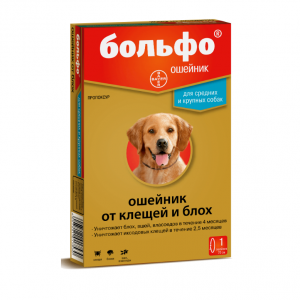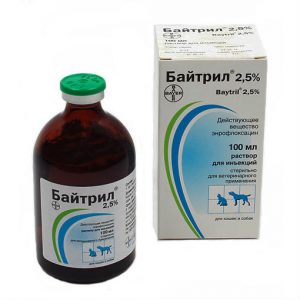Description
Pharmacological action
Prazicide tablets belong to the combined anthelmintic drugs.
The pyrantela pamoate and praziquantel, which are part of the preparation, provide its wide spectrum of anthelmintic action on all phases of the development of round and ribbon helminths, which are parasitic in dogs and cats, including Tohosara sanis, Tohosara mystax, Toxascaris leonina, Uncinaria stenocepha , Ancylostoma caninum, Echinococcus granulosus, Alveococcus multilocularis, Mesocestoides lineatus, Dipylidium caninum, Diphyllobothrium latum, Multiceps multiceps.
The mechanism of action of praziquantel is associated with the blocking of neuromuscular conduction in helminths. The mechanism of action of the pyrantel pamoate is to block neuromuscular transmission, impaired permeability of cell membranes and inhibition of cholinesterase, which leads to paralysis and death of helminths.
When administered orally, praziquantel is well absorbed in the gastrointestinal tract, reaching a maximum plasma concentration after 1 to 4 hours, and distributed in the organs and tissues of the animal is excreted mainly in the urine (up to 80%) within 24 hours . Pyrantela pamoate is poorly absorbed, which ensures its prolonged effect on helminths in the intestine, it is excreted from the body mainly in unchanged form with feces (93%).
Prasicide tablets, according to the degree of exposure to the body, are classified as low-hazard substances (hazard class 4 according to GOST 12.1.007-76), at the recommended doses they do not have embryotoxic, teratogenic and sensitizing effects. Well tolerated by dogs and cats of different breeds and ages.
Indications
Prazicide tablets are prescribed for dogs and cats for prophylactic and therapeutic purposes with nematodoses (toxocariasis, toxascaridosis, uncinariosis, trichocephalosis, hookworm), cestodoses (teniidosis, dipyldiosis, echinococcosis, diphyllobothriasis, mesocestoidosis) and mixed nematode-cestodosis invasions.
Contraindications
Contraindication to the use of the drug is individual intolerance to the components of the drug (including a history). Prazitsid tablets should not be used exhausted, sick with infectious diseases and recovering animals.
Special instructions
With swelling of the nasal mucosa, severe rhinitis, absorption of desmopressin may be impaired with intranasal use. In such cases, sublingual administration is recommended.
In order to avoid volume overload when prescribing desmopressin, special monitoring of the condition is necessary in patients of the following groups: lactating females – 2 to 3 weeks after birth. Prazicide tablets should not be used in puppies and kittens younger than 3 weeks of age.
Violations of the animal deworming regimen should be avoided, as this may lead to reduced effectiveness. If the next deworming is skipped, the drug must be administered as soon as possible in the same dose, then the interval between drug administrations does not change.
When using Prazicide tablets in accordance with these instructions, side effects and complications in animals, as a rule, are not observed. In some animals, gastrointestinal tract disorders (loose stools, vomiting) and increased salivation, which disappear spontaneously and do not require the use of drugs, are possible.
Prazicide tablets should not be used simultaneously with piperazine and drugs inhibiting cholinesterase.
Prazicide tablets are not intended for use by productive animals.
Composition
Pyrantela pamoate – 50 mg / tablet, praziquantel – 15 mg / tablet, excipients up to 1 mg.
Dosage and administration
Prazicide tablets are used individually, once, in the morning by animals with a small amount of food or treats in the following doses: • for dogs – 1 tablet weighing 500 mg per 10 kg of animal weight
• for cats – 1 tablet weighing 200 mg per 3 kg of animal mass.
A preliminary fasting diet and laxatives are not required. With a strong degree of invasion, deworming is recommended to be repeated after 10 days. For prophylactic purposes, deworming is carried out at a therapeutic dose on a quarterly basis, as well as before each vaccination.
Overdose of
In case of drug overdose, an animal may experience depression, refusal to feed, excessive salivation, gastrointestinal upset.
tablet dosage form of tablets




